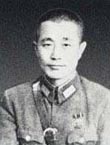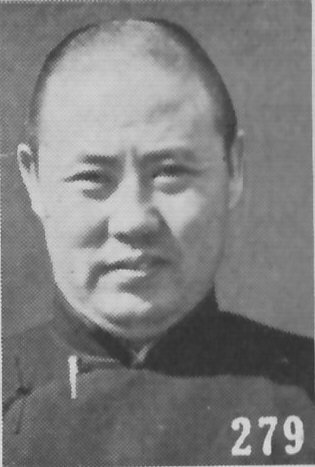<Back to Index>
- Lieutenant General of the National Revolutionary Army Du Yuming, 1904
- General of the National Revolutionary Army Fu Zuoyi, 1895
PAGE SPONSOR

Du Yuming (Chinese: 杜聿明; 1904 – 1981) was a Kuomintang field commander active in the Sino - Japanese War theater of World War II and in the Chinese Civil War from 1945 to 1949.
A trusted protégé of Chiang Kai-shek, Du was a graduate of the first cadet class at the Whampoa Military Academy. During the Second Sino - Japanese War, he commanded the KMT 5th Corps in the First Changsha Campaign, and Battle of South Guangxi.
During World War II, he commanded the same 5th Corps or Nationalist Fifth Army in the Battle of Yunnan - Burma Road from mid March to early June 1942, during the Burma Campaign under Lieutenant General Joseph Stilwell. When the British Army collapsed and abandoned their Chinese saviors to their fate, Du was forced to order a hastily planned withdrawal that resulted in the loss of 50,000 Chinese soldiers. Yet, Du was also criticized for dismissing General Sun Li-Jen's advice that the route back to China is hazardous and should instead retreat with the British to India. Most men that followed Du died in the Burmese jungle of tropical disease and starvation or were killed by the Axis forces. On the other hand, Sun's army retreated in an orderly fashion into India.
After the war, Du helped strengthen the Nationalist position in the Southwest by removing Long Yun, the local warlord of Yunnan Province in October 1945. Du was then transferred to the Northeast Theater to consolidate Kuomintang control. For most of the Civil War, he served as a field commander in Manchuria and Eastern China.
Toward the end of the struggles against the communists, Du correctly guessed that Major General Guo Rugui (郭汝瑰), one of Chiang's most trusted staff officers, was a communist agent but the only evidence he came up with was that unlike most corrupted nationalist cadres and officers, the suspected communist spy was clean. Obviously, this was not a good reason and Chiang was enraged when Du presented his view, because Chiang interpreted such reason would imply that all of the nationalists were corrupted, and only the communists were clean, not mentioning the fact that Du's wife was once a communist herself.
Du was captured during the Huaihai Campaign and held in communist prisons until his pardon in 1959, after which he was rewarded with a high ranking position in the Chinese People's Political Consultative Conference, reportedly because the Chinese government wanted to convince his son - in - law Yang Zhenning, a Nobel laureate in physics, to return to China. The communist agent Du correctly suspected was also in the same political organization, and the two became friends.

Fu Zuoyi (simplified Chinese: 傅作义; traditional Chinese: 傅作義) (June 2, 1895 − April 19, 1974) was a Chinese military leader. He began his military career in the service of Yan Xishan, and he was widely praised for his defense of Suiyuan from the Japanese. During the final stages of the Chinese Civil War, Fu surrendered the large and strategic garrison around Beiping to Communist forces. He later served in the government of the People's Republic of China.
Fu began his career as an officer in Yan Xishan's Shanxi army. He served with distinction during the 1927 - 1928 Northern Expedition, after Yan declared his allegiance to the Kuomintang. Fu fought for Yan in the 1929 - 1930 Central Plains War, when Yan attempted to form a central government with himself as President. Yan's forces were easily routed by the forces of Chiang Kai-shek, and Yan was forced to live for a short period in exile.
After Yan returned to Shanxi in 1931, Fu led Yan Xishan's efforts to "colonize" and take control over the Inner Mongolian province of Suiyuan. Most of the work and settlement of Suiyuan at this time was done by Shanxi farmer - soldiers under Fu's direction. The activities of Fu's farmer - soldiers included mining Suiyuan's iron deposits (24% of all in China) and bringing over 4,000 acres (16 km2) of farmland under cultivation for the first time. Fu cultivated a close relationship with Zhang Xueliang in order to increase the legitimacy of Yan's control over Suiyuan.
In March 1936, Manchurian troops occupying Chahar invaded northeastern Suiyuan, contesting Fu's control. These Japanese aligned troops seized the city of Bailingmiao in northern Suiyuan, where the pro - Japanese Inner Mongolian Autonomous Political Council maintained its headquarters. Three months later, the head of the Political Council, Prince Teh (Demchugdongrub) declared that he was the ruler of an independent Mongolia (Mengguguo), and organized an army with the aid of Japanese equipment and training. In August 1936 Prince Teh's army attempted to invade eastern Suiyuan, but it was defeated by Yan's forces under the command of Fu Zuoyi. Following this defeat, Prince Teh planned another invasion while Japanese agents carefully sketched and photographed Suiyuan's defenses.
In November 1936 the army of Prince Teh presented Fu Zuoyi with an ultimatum to surrender. When Fu responded that Prince Teh was merely a puppet of "certain quarters" and requested that Teh submit to the authority of the central government, Prince Teh's Mongolian and Manchurian armies launched another, more ambitious attack. Teh's 15,000 soldiers were armed with Japanese weapons, supported by Japanese aircraft, and often led by Japanese officers. (Japanese soldiers fighting for Mengguguo were often executed by Fu after their capture as illegal combatants, since Mengguguo was not recognized as being part of Japan).
In anticipation of the Second Sino - Japanese War, Japanese spies destroyed a large supply depot in Datong and carried out other acts of sabotage. In order to defend Suiyuan, Yan placed his best troops and most able generals, including Zhao Chengshou and Yan's son - in - law, Wang Jingguo, under Fu's command. During the month of fighting that ensued, the army or Mengguguo suffered severe casualties. Fu's forces succeeded in occupying Bailingmiao on November 24, 1936, and was considering invading Chahar before he was warned by the Kwangtung Army that doing so would provoke an attack by the Japanese Army. Prince Teh's forces repeatedly attempted to retake Bailingmiao, but this only provoked Fu into sending troops north, where he successfully seized the last of Teh's bases in Suiyuan and virtually annihilated his army. After Japanese were found to be aiding Teh, Yan publicly accused Japan of aiding the invaders. Fu's victories in Suiyuan over Japanese - backed forces were praised by Chinese newspapers and magazines, other warlords and political leaders, and many students and members of the Chinese public. Fu's victories in Suiyuan greatly increased his prestige, and the prestige of Yan Xishan.
During the Second Sino - Japanese War, Fu held numerous commands in North China. As Commander of 7th Army Group he fought in Operation Chahar, the Battle of Taiyuan and the 1939 - 40 Winter Offensive, winning the Battle of Wuyuan. Fu ended the war as Commander of the 12th War Area, comprising Jehol, Chahar, and Suiyuan.
During the Chinese Civil War, Fu's forces (500,000 men) controlled the critically important Suiyuan - Peiping Corridor that separated Manchuria from China proper. After the Communists captured the Manchurian provinces in late 1948, Communists infiltrated Fu's inner circle and pressured Fu to negotiate a peaceful solution for the inevitable Communist takeover. At the same time, Fu became increasingly disillusioned with Chiang. Fu's personal estrangement from Chiang reaching a climax in October 1948, when Chiang suddenly withdrew from a critical meeting to discuss the defense of territory under Fu's command without giving any immediate explanation.
The circumstances for Chiang's sudden departure were not discovered until later. Sometime earlier Chiang's son, Chiang Ching-kuo, had arrested and refused to release his cousin, Kong Lingkan (孔令侃), as part of a broader an effort to punish economic and financial criminals. Realizing that her nephew could be executed for his crimes, and that Chiang Ching-kuo was highly likely to execute Kong to set an example, Soong May-ling begged Chiang Kai-shek to fly immediately to Shanghai to rescue Kong. Chiang Kai-shek agreed to save Kong, and left in the middle of the most important stage of defensive planning. Chiang's sudden departure was a great blow to Nationalist morale and left an impression on Fu and many other Nationalist commanders that Chiang had placed the welfare of his family above the welfare of the nation.
Communist agents active within Fu's inner circle included Fu's own daughter, Fu Dongju (傅冬菊), and Fu's most trusted personal secretary, Major General Yan Youwen (閻又文), who was from the same hometown as Fu, Ronghe, in Yuncheng. Fu Dongju, Yan Youwen, and other agents pressured Fu to surrender and repeatedly passed vital intelligence to the Communists. Fu began secret negotiations with Lin Biao, in which he arranged the surrender of the Beiping garrison, totaling a quarter of a million men, on January 31, 1949. Yan Youwen acted as Fu's representative during Fu's communication with Lin, but Fu did not know the true allegiance of Yan until after the establishment of the People's Republic of China.
Fu’s contributions to the Communist Party of China's success were rewarded with high posts, including the Minister of Hydraulics and posts in the Chinese People's Political Consultative Conference. During the Cultural Revolution Fu was unable to protect his own family members, despite his position in the government.
Although Fu's daughter, Fu Dongju, had been recognized as an ardent Communist undercover agent who played a critical role in infiltrating Fu's inner circle, leading to her father's eventual surrender in 1949, she was repeatedly subjected to humiliating public persecution by Red Guards during the Cultural Revolution (1966 – 1975). After the end of the Cultural Revolution, Fu Dongju took the leadership of a United Front division, and retired in 1995. She died in 2007.